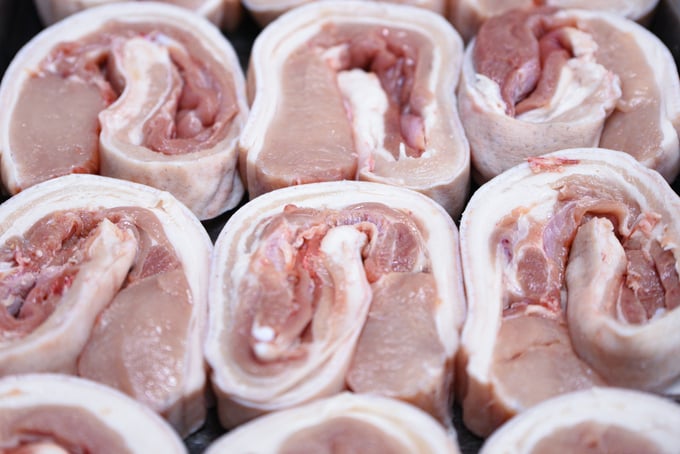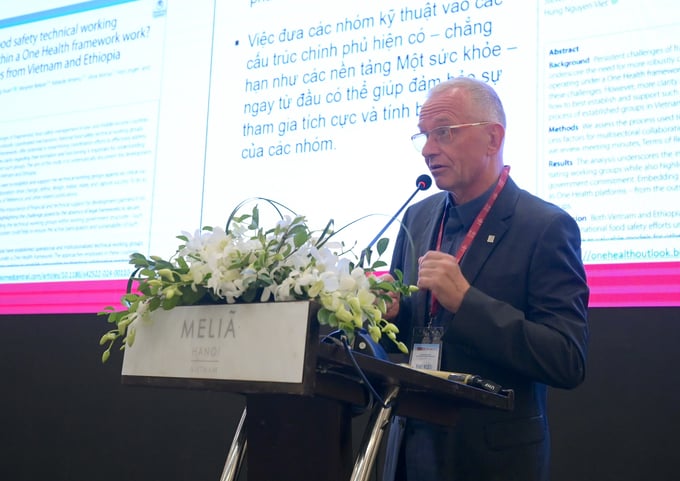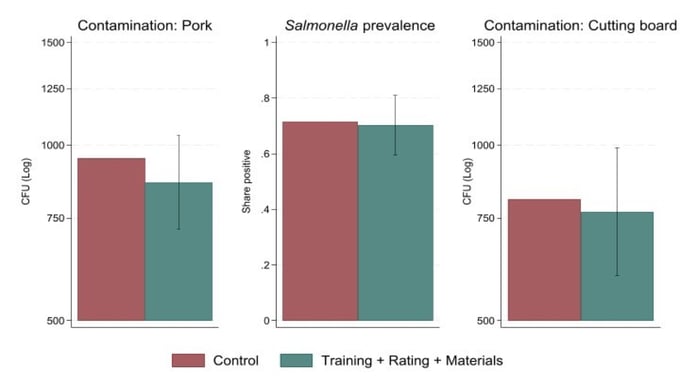June 19, 2025 | 01:39 GMT +7
June 19, 2025 | 01:39 GMT +7
Hotline: 0913.378.918
June 19, 2025 | 01:39 GMT +7
Hotline: 0913.378.918

Food safety interventions at pig slaughterhouses and markets have helped reduce the level of microbial contamination and increased pork meat value. Photo: Tung Dinh.
According to Dr. Fred Unger, the Regional Representative ILRI Asia, the Food Safety Working Group (FSWG) under the framework of OHP Framework, co-hosted by MARD, MOH, MONRE and ILRI, was established in September, 2023.
The working group aims to improve food safety in Vietnam and strengthen the competitiveness of Vietnamese food for domestic consumption and international trade.
Currently, the FSWG consisting of more than 60 organizations, networks, is actively engaging and contributing in responding to food safety in Vietnam. In particular, the group expanded to partner with other NGOs, CSOs, private sectors, and sectoral associations.
Dr. Fred Unger continued that in Vietnam, food safety interventions have been carried out at pork shops of some traditional markets and slaughterhouses. Specifically, in the markets, the plan has been implemented across 5 localities from September 2023 until now, including the provinces of Thai Nguyen, Hanoi, Thua Thien Hue, Dong Nai and Can Tho. Of which, there are 34 trials and 34 control markets focused on pork shops.
The intervention aims to improve food safety practices and knowledge for butchers and reduce the level of microbiological contamination (Salmonella, TBC) at pork shops.
For slaughterhouses, the plan was implemented at small and medium-sized slaughterhouses in 4 localities from July to November 2024, including the provinces of Thai Nguyen, Hanoi, Thua Thien Hue and Can Tho with 8 trials and 8 control pig slaughterhouses. The goal is also to improve food safety practices and knowledge among slaughterhouse workers and reduce levels of microbiological contamination (Salmonella, TBC).

Dr. Fred Unger, ILRI Representative in Asia, shared about food safety interventions in Vietnam. Photo: Tung Dinh.
Dr. Fred Unger stated that after implementing food safety interventions, both action and awareness indicators regarding pork processing and consumption at slaughterhouses and traditional markets increased.
In terms of actions, the scores related to providers ensuring handwashing with soap, clean knives and cutting boards, using easily sanitized tools, and sorting products improved.
The hardware scores pertained to handwashing stations, soap/cleaning agents, disinfectants, and separate knives for different products. Awareness scores reflected the consumer demand for clean and safe products.
Additionally, the total bacterial count on pork samples and cutting boards, along with the rate of Salmonella contamination in pork samples, decreased following the task force's intervention.
Moreover, the revenue of those involved in the food safety intervention increased, as did the value of stored pork and the price of the most popular cut (pork belly).

The level of microbiological contamination decreased (green compared to red) after the food safety intervention. Photo: ILRI.
The activities of the working group in Vietnam have been integrated with community food safety programs and have involved One Health collaboration among healthcare and veterinary sectors, using an interactive food safety training approach.
During the training, vendors showed enthusiasm in participating throughout the process, but lacked the infrastructure to comply with the recommended practices. Business outcomes at the intervention markets improved, and better microbiological indicators were also observed.
"Strong connections with local stakeholders are crucial for uptake and impact," affirmed the ILRI Asia leader.
Through these results, the ILRI Asia Regional Representative suggested that integrating Food Safety Working Group into national processes could be translated into policies and practices to promote food safety.
“These experiences from Vietnam could be useful for other countries in establishing the Food Safety Working Group to improve food safety through coordinated efforts”, said Mr. Fred Unger.
Translated by Kieu Chi

(VAN) To address plastic pollution, closing the plastic recycling cycle will bring significant economic and environmental benefits.

(VAN) According to the Binh Thuan Department of Industry and Trade, in the first five months of 2025, Binh Thuan's dragon fruit export turnover increased by 20.65% compared to the same period last year.

(VAN) EU countries on Thursday gave final approval to new tariffs on fertilizer imports from Russia, a move aimed at cutting off revenue that could support Moscow’s war in Ukraine, despite concerns from European farmers.

(VAN) The working delegation from the Ministry of Agriculture and Environment conducted an important trip to the Netherlands to strengthen strategic partnerships and sustainable development in the agricultural sector.

(VAN) The letter ‘A Plea from the Ocean’ not only evokes emotion but also awakens the human conscience to the responsibility of protecting life on Earth.

(VAN) The Department of Agriculture in South Africa has announced the country’s first mass vaccination of poultry to prevent local birds from contracting avian influenza.

(VAN) Establishment of the Mekong Delta Regional Agricultural Linkage Center, aiming for a closed value chain, deep processing, trading platforms, and international market connectivity.